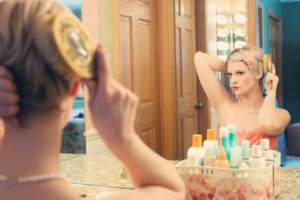
Addiction in the Modeling Field – Part 3
J – Now, looking at huge model celebrities such as Kate Moss or Naomi Campbell, the media shows their lives looking so glamorous, but they have also had really destructive patterns with addiction. Is that a realistic portrayal of what it is like in modeling?
N – It absolutely is. For me, once I started making a lot of money, having my face out there, and booking a lot of jobs, it became difficult because I began to lose touch with reality.
All you focus on is what you look like because your income is equivalent to how you look.
Now it is also different because of social media. I stopped modeling in 2012, and social media wasn’t really happening. Six months to a year later, social media exploded, and there was no longer just taking your portfolio to photographers to get casted for a job.
My friends told me it became taking your portfolio, but then they also want to see that you have a million followers, so it became an even more superficial lifestyle.
 However, once you are modeling it is very hard to get out because you can get so wrapped up in your image and building your brand.
However, once you are modeling it is very hard to get out because you can get so wrapped up in your image and building your brand.
Also, you’re making a lot of money, say, ten thousand dollars a day once you really get into the business.
You get scared to lose all of this because you feel it is all you have.
It is similar to sports in the way that you put so much into something and, if you lose it, then what do you have?
Even someone like Kate Moss, she built her entire life around that, imagine losing it, it is terrifying!
J – Absolutely! Now, in your amazing book, Washed Away: From Darkness to Light, you talk about leaving the industry. Was part of the reason you left the modeling industry to get away from addiction culture, or, what was the main reason?
N – I honestly thought I would never leave modeling. At the time, I was preparing to leave Europe and go back to New York. I had worked really hard to rebuild myself and sign with the best agency in New York.
Unfortunately, my health was so poor as a result of the abuse. I had pushed myself too hard to the point where I just became sick. My anorexia was at a horrible point, as well.
It was really a combination of having anorexia and realizing that there were times in my life where I was not able to handle drugs and alcohol.
I watched my mother become very very sick because she had a problem with alcohol and it was killing her.
My brother and I put her into rehab in 2012, but she didn’t stay for more than 60 days.
She also had some serious mental health issues with Dissociative Identity Disorder and Bipolar Disorder.
You can function and be very healthy within society with those disorders, but with the alcohol, she became too far gone.
She passed away in a car accident in 2012, and it was at that time that I decided to get help for myself.
I saw my mother’s life and my own life and the parallels and realized that I was declining fast. I had to make a decision to take care of myself because I had never done that.
Everything was always so based on my career, on trying to look good but not really feeling good on the inside.
I left modeling, and I was shocked because I never thought I would do that. I thought I would always be a model.
Today, I can say that was the best decision I ever made.
It took me a few years to get better but I have been sober for six years, now, and I’ve been strong in recovery from my eating disorder for five years.
 I went back to school a few years ago for psychology, want to be a doctor one day, wrote my book Washed Away: From Darkness to Light and this February it is coming out in French under a different title in France.
I went back to school a few years ago for psychology, want to be a doctor one day, wrote my book Washed Away: From Darkness to Light and this February it is coming out in French under a different title in France.
I just know that God had a plan all along. I didn’t know what the plan was, and I still don’t, but I am taking it day-by-day. I’m very grateful that I’m not on drugs and alcohol anymore. I used to think it was the best escape for me but I didn’t realize that I was killing myself to avoid all of the issues I didn’t want to face like my career, my childhood, my trauma, the abuse I experienced.
I still have things day-to-day that I have to work on, things that come up, but I am able to handle them because I don’t rely on unhealthy things to deal with challenges. Instead, I lean and rely on and trust God to deal with those things.
I do see a therapist and take medication. I, actually, recently started seeing a therapist that does hypnotherapy just to try a different type.
I’m so thankful to God that I’m sober and know that, if I can do it, anyone listening can do it.
It just takes that first step in saying “I don’t want to look like this anymore, I don’t want to be a victim of the drugs and alcohol, I’m getting help.”
Recovery will be different for everyone, I went to AA and got the Recovery Bible, but the most significant step is asking for help.
I really believe it happens one day a time, the grace of God, staying away from people, places, and things that trigger, and learning and knowing how to say no.
It takes a long time, but it can be done.
If you’re in that place right now where you feel like you don’t know how to get out of it, you just need to know that you can do it with God’s help and just to ask for help because someone out there is going to be able to help you.
Please See
Addiction in the Modeling Field – Part 1
Addiction in the Modeling Field – Part 2
Source:
Virtual Presentation by Nikki DuBose in the January 24, 2018 Addiction Hope Inaugural Online Conference & link to the press release at https://www.prnewswire.com/news-releases/eating-disorder-hope-offers-inaugural-online-conference-300550890.html
 About the Presenter: Nikki DuBose is a model, author, and advocate. She is the Co-Founder of The Artists League for Change, a national nonprofit dedicated to preventing mental health issues and abuse through the creative arts, and is an Ambassador for the Shaw Mind Foundation. Her debut memoir, Washed Away: From Darkness to Light was released September 30, 2016, in the U.S. and will be released in French in 2018 with Editions du Rocher.
About the Presenter: Nikki DuBose is a model, author, and advocate. She is the Co-Founder of The Artists League for Change, a national nonprofit dedicated to preventing mental health issues and abuse through the creative arts, and is an Ambassador for the Shaw Mind Foundation. Her debut memoir, Washed Away: From Darkness to Light was released September 30, 2016, in the U.S. and will be released in French in 2018 with Editions du Rocher.
Nikki has been featured on television shows and networks such as The Doctors, TD Jakes, CBS Los Angeles, and the Oprah Winfrey Network, and profiled in publications such as People, LA Times, and Vogue UK. She worked alongside Assemblymember Marc Levine on California Assembly Bill 2539, which addressed the need for workplace protections and health standards in the modeling industry. She gives talks regularly on her recovery at universities and treatment centers and writes extensively on mental health, political issues, and the modeling industry on the NY Daily News, The Huffington Post, PsychCentral, and more.
 About the Transcript Editor: Margot Rittenhouse is a therapist who is passionate about providing mental health support to all in need and has worked with clients with substance abuse issues, eating disorders, domestic violence victims, and offenders, and severely mentally ill youth.
About the Transcript Editor: Margot Rittenhouse is a therapist who is passionate about providing mental health support to all in need and has worked with clients with substance abuse issues, eating disorders, domestic violence victims, and offenders, and severely mentally ill youth.
As a freelance writer for Eating Disorder and Addiction Hope and a mentor with MentorConnect, Margot is a passionate eating disorder advocate, committed to de-stigmatizing these illnesses while showing support for those struggling through mentoring, writing, and volunteering. Margot has a Master’s of Science in Clinical Mental Health Counseling from Johns Hopkins University.
The opinions and views of our guest contributors are shared to provide a broad perspective of addictions. These are not necessarily the views of Addiction Hope, but an effort to offer discussion of various issues by different concerned individuals.
We at Addiction Hope understand that addictions result from a combination of environmental and genetic factors. If you or a loved one are suffering from an addiction, please know that there is hope for you, and seek immediate professional help.
Published on July 27, 2018
Reviewed on July 27, 2018 by Jacquelyn Ekern, MS, LPC
Published on AddictionHope.com
